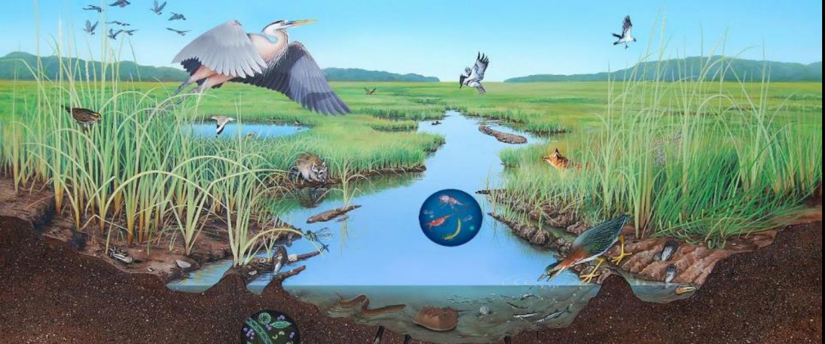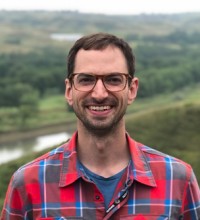
Delta Science Fellowship 2020
Fellow: Matthew Bogard, Postdoctoral, University of Washington
Research mentor: David Butman, University of Washington School of Environmental and Forest Science
Community mentors: Lisamarie Windham-Myers, United States Geological Sur
Why this research matters
In addition to providing important habitat to aquatic and terrestrial plants and animals, coastal wetlands are an important carbon sink. Wetland plants extract carbon from the atmosphere and incorporate it in vegetation and roots, eventually packaging it into sediments.
The carbon-rich soil in coastal wetlands has led to great interest in wetland restoration projects for the purpose of carbon storage. But coastal wetlands also leak carbon out to the ocean in dissolved form, so the extent to which they can serve as sites for long-term carbon storage is unclear. This study aims to create a more refined model of the carbon cycling systems in the San Francisco Bay Delta region.
Project
This study aims to produce an integrated, net ecosystem carbon budget for Suisun Marsh, a representative ecosystem in the delta. This project combines diverse measurements on land and in the adjacent marine environment to produce the first directly measured, complete carbon budget for a coastal wetland habitat. This work has generated a more complete picture of the potential of wetland preservation for greenhouse gas reduction, as well as the processes that shape wetland accretion and resilience to sea-level rise.
The project will provide vital information for understanding the ecosystem services, food webs, and carbon storage potential of the region’s wetlands, as well as provide new methodology that could be used by researchers around the world.
Results
Initial results from the project demonstrate a striking loss of carbon from the largest stable brackish tidal marsh on the Unites States Paci c coast. Direct measurements show that 41% to 53% of carbon dioxide absorbed from the atmosphere is not stored in wetland soils, but rather transferred through tidal fluxes to aquatic environments in the estuary. The observations suggest that tidal marshes play a dual role in trapping atmospheric carbon dioxide, both storing the material in soils as well as exporting it to downstream estuarine processes.
Management Applications
This project has contributed to understanding the role that coastal wetlands play in carbon and nitrogen cycling in marine environments. Given the dramatic loss of marsh habitat in the San Francisco Bay Estuary and in other estuaries around the world, it is especially important to study the role of these estuaries in the carbon cycle. This project has shown that a large fraction of carbon sequestered in delta wetlands remains stored in soils, while some fraction of the carbon lost to the ocean may also remain dissolved and may also contribute to long term storage. These findings will help to better model the marine carbon cycle and should inform policies related to marsh restoration and protection aimed at enhancing carbon sequestration.
Publications and Presentations
Bogard MJ, Bergamaschi B, Butman DE, Anderson F, Knox S, Windham-Myers L.
Hydrologic export is a major component of coastal wetland carbon budgets. 2020. Global
Biogeochemical Cycles. doi: 10.1029/2019GB006430.
Vachon D, Sadro S, Bogard MJ, Baulch H, Lapierre JF, Rusak J, Laas A, Denfeld B,
Staehr P, Weyhenmeyer G, Obrador B, del Giorgio PA. Coupled O2-CO2 dynamics in
surface waters as integrative insights on lake ecosystem functioning. 2020. Limnology
and Oceanography Letters. doi: 10.1002/lol2.10135
Oikawa P, Bahramian J, Carlin J, Chu H, Dronova I, Knox SH, Bogard MJ, Anderson F,
Bergamaschi B, Windham-Myers L, Hemes K, Eichelmann E, Verfaillie J, Szutu DJ, Valach A,
Baldocchi D. 2019. Measuring and modeling ecosystem carbon budgets and greenhouse gas
exchange from restored marshes across a salinity gradient. American Geophysical Union Fall
Meeting, United States
Bogard MJ, Collins J, Boysen A, Wickland K, S Sadro, SE Johnston*, A Ingalls, L Windham-
Myers, B Bergamaschi, R Striegl, M Dornblaser, R Spencer, D Butman. 2019. Exploring
planktonic respiration using short-term in situ measurements. Society for Freshwater Science
Annual Meeting, United States
Attachments
 Matthew Bogard
Matthew Bogard
